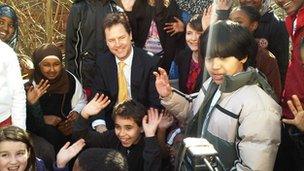How much anger on the doorstep?
- Published
- comments

"Do you enjoy being deputy prime minister?"
It's one of the moments senior politicians must dread - the pre-conference-speech filming opportunity with local school children, curious, local school children who - without even trying - can put you on the spot.
It's only a few years ago that I watched as a Cardiff pupil asked Gordon Brown, who was about to - if memory serves me - take over from Tony Blair, if he liked being Prime Minister. He was stumped. It was the First Minister, Rhodri Morgan, who took it all in his stride on Mr Brown's behalf.
And so to Nick Clegg, who warmed up to the Welsh Liberal Democrat Spring conference in Cardiff over the weekend with a question and answer session in Adamsdown. Cue pupil: "Do you enjoy being deputy prime minister?" Mr Clegg replied with a smile: "Most of the time".
Do Liberal Democrats enjoy being Liberal Democrats these days? The short answer would seem to be - at a push - most of the time, but a hell of a lot more than they did 12-18 months ago.
If senior party figures and councillors are feeling a sense of foreboding about what might happen to the party at the local elections on May 3rd, then it was kept very quiet during this weekend's event. That, mind you, might not come as a surprise. Camera everywhere = keep calm and carry on.
They're the party with most to lose, remember, and the proportional nature of the Assembly's voting system camouflaged the hit they took a year ago, losing only one of their six seats. They lead three large councils, in Cardiff, Swansea and Wrexham and are desperate to hold on to control in each of them.
The stakes could hardly be higher for them in May, with retaining their leadership of those authorities as important - and for much of the party, even more important perhaps - than retaining a decent number of AMs was in last year's poll.
The party faced a real battle in April and May 2011, one year in to the coalition government at Westminster, with the programme of public spending cuts and their implications clearly outlined.
The move to raise tuition fees to £9,000 late the previous year, totemic for those screaming betrayal by the Lib Dems in terms of their pre-election promises, was still very current and keenly felt.
But on both sides of the political divide, there appears to be a sense that, a year on, that "betrayal narrative" is starting to lose some of its potency - and with it, its electoral advantage to the Lib Dems' political opponents.
Briefing journalists ahead of his speech, the most senior Liberal Democrat councillor in Wales, Rodney Berman was clear that the white-hot anger which was felt on many doorsteps against his party since that deal between David Cameron and Nick Clegg in 2010 has begun to cool.
"It doesn't get mentioned that much and has lessened a lot since last year," he said.
"What people can see is that it takes time to make that influence.
"A year ago there was a bit more anger on the doorstep. That has dissipated quite a bit."
He added, "We can go out to the electorate with our heads held high and trumpet what we have achieved."
Much as football managers stick negative newspaper headlines up in dressing rooms to motivate their players, I'm willing to bet his comments will be pinned up in Labour's campaign HQ.
However, some insiders there acknowledge that his analysis has some grounding in reality.
One told me last week that he suspects the Lib Dems, by front-loading difficult stuff, "hit rock bottom last year ... There's only so far they can sink". In other words, it's up to Labour to remind people of things they were very angry about ... a little while ago.
Nick Clegg got a relatively easy ride from the members of the Saturday morning homework club in Adamsdown on Saturday (despite a tricky question as to whether he is "friends" with David Cameron - answer: "We work together") but a tougher time from a few dozen anti-cuts protesters outside the conference venue around the corner as he arrived for his speech.
Mr Clegg could have swept in through the side entrance of the hotel, avoiding the heckles. He was pre-warned of the protest and offered a quiet way in. But he decided he would rather drive up to the front door and walk in past the protest group, who chose as their chanted greeting, "Nick Clegg, we hate you, you're a bloody Tory too".
I don't get the impression Mr Clegg is a particularly macho, or indeed masochistic individual - and apart from a brief turn of the head as he climbed the hotel steps, there was no attempt to face down, or even engage with the protesters. But in terms of political strategy, he may well have concluded that television pictures contrasting him walking in calmly with a relatively small but vocal group waving placards may - and I stress the may - not be unhelpful.
The big question for May is where the majority of voters are heading - calmly climbing the stairs with Mr Clegg, or still shouting about that fateful coalition deal.